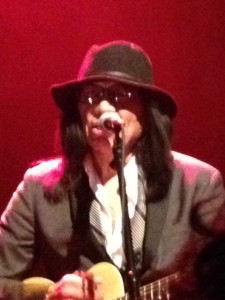“Rodriguez at Lincoln Hall, September 20, 2012â€
By Benjamin Ortiz, ChicagoMusic.org Contributor
September 21, 2012
The sold-out crowd of about 500 souls at Lincoln Hall remains unusually still, in church-like reverent quietude, except for a few stray catcalls of encouragement and enthused gratitude, while lone guitarist Sixto Diaz Rodriguez takes two or three minutes of false starts, whispering to his instrument and to himself, as he finds the right tuning for his song “Sugar Man,†that eerie, jangling, psychedelic gutter ditty full of wistful answers that make all existential questions melt away, the first tune on his first Cold Fact record from 1970 that has survived the mythologized death and total disappearance of that great American folk-rock voice that should’ve hit as big as Bob Dylan but simply (and almost) never was.
Tonight, his fans have been waiting just about 40 years to hear this artist live, some of them without even knowing they, too, were “Searching for Sugar Man†and awaiting his resurrection from the rubbish pyre of forgotten music, a Greil Marcus-style “Secret History†of rock if ever there was one, to make us all rewrite the Top 40 timelines that inform the rise and fall and rise again of popular music.
He cuts an undertaker’s pose on stage, with the kind of deep-crowned hat he wore on his first record cover over wispy black locks, clad also in an indistinct black coat and pants (tailored leisure-suit-style, like from a time capsule), linen shirt, and dark, spangled vest, keeping the audience wondering who’s really behind that voice, who’s looking out from those shaded glasses that only seem to deepen the mystery behind the man.
The 2012 movie Searching for Sugar Man, now also the name for his current tour, documents and gently, lovingly re-constructs the thrilling bio of Rodriguez, a Detroit Mexican-descent manual laborer who put out two records and then was seemingly extinguished from the face of the Earth, only to find triumphal recognition that eluded him almost completely in the U.S. when fans in South Africa, who heard him on bootlegs and spread his story, pursued the man like phantom hunters, finding him still alive and content to toil away in frosty, gritty obscurity back on the near-dead streets of his own Midwestern ghost town.
The myth sounds like the apotheosis of ’60s protest folk music, ending in self-immolation either by bullet or bonfire, as his South African fans thought him dead by suicide literally on the stage of his last show, yet his handful of recordings kept the fire alive and even informed their resistance to Apartheid. Searching is a great underdog story, indeed, as it pictures Rodriguez trudging crookedly through the sooty snow of bitter Detroit death season, icy wind biting into the crags of his impassively lunar face.
But tonight, that face is all man in the moon, his understated presence beaming with a smile that suggests a much-less flamboyant resemblance to fellow Michigan-native (by way of Mexico) Question Mark, from the Mysterians. The sonic resonances, too, are legion: Leonard Cohen, James Taylor, Jose Feliciano, and of course Dylan, whom Rodriguez generously recognizes in a gleeful cover of “Like a Rolling Stone,†after which he jokingly admits, “Hey, I’m attempting to do Shakespeare, here.â€
But he kicks off the whole show with a stirring rendition of his own “Establishment Blues,†in which he proclaims that “This system’s gonna fall soon, to an angry young tune/ And that’s a concrete cold fact,†doling out sardonic observations that turn over life’s most pungent contradictions, while his fans at Lincoln Hall sing and groove along.
After a few songs, he shares a series of one-liners and corny jokes (like, “Free love is too expensiveâ€), as if he’s obliged to entertain and please the crowd even between tunes, but then he launches into “Rich Folks Hoax,†saying that “Young folks share the same jokes/ But they meet in older places.â€
“I love you,†someone yells, and “I love you back,†he answers, vibing with the crowd: “Keep telling me, baby!†Among other revelations, he tells his fans that he’s voting for Obama and that at 70 years old he’s still going strong: “It’s all an act, man!â€
He ends the show with another crowd pleaser, “Blue Suede Shoes,†as if to point up his own folk-monk appearance and the odd saga of the enduring passion surrounding his music after so many decades.
« Chicago World Music Festival 2012 Preview (ChicagoMusic.org) Dennis Farina: Truman Alum, Rest in Peace »



